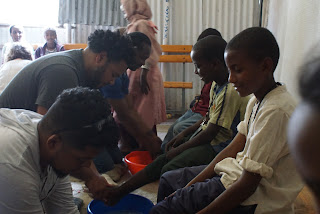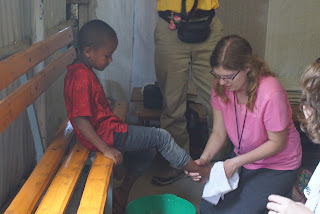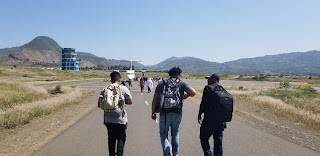All Good Things Must Come to an End
I am 30000+ feet over the Atlantic Ocean, on my way home
after a great, but tiring week. I am woefully behind in my blog entries.
Friday, our last day at the care points, was all that we had
hoped for. It was joyous, exhilarating, fun, and emotional.
The day started at the CHDA. Max was set to interview one of
the college students from Meserete in the park, so while we waited for him and
Sean to return, we played games with the children. One of the boys walked over
to me and let out a long boisterous (Toommmm!), to which I replied
(Abelllllll!). It became a running joke fo the rest of the morning, the two of
us going back and forth drawing out each other’s names, sometimes with a funny
voice. Others joined in, so there was a near constant chorus of “Mohammeddddd!”,
“Tamelllllll!”, “Abellllllll!”, “Tommmmm”!) A little silly, but when you don’t
speak each other’s languages, it was a way to connect.
I also played A LOT of Connect 4. One boy was bound and
determined to beat me. . Unfortunately, he just couldn’t figure out how to get
me, although he came close. I took turns
playing three boys for about thirty minutes Another boy finally got me. It gave
me the chance to interact with some other kids. “Abellllll!” “Kadirrrrrr!”, “Halimetttttt!”
Max and Sean returned so Moses did the traditional lesson on
Jesus washing the disciples’ feet. Then, we washed the children’s feet. I
always look forward to this part of the week, as it re-emphasizes that we are
here to serve the children. I love how Childlren’s Hopechest focuses on true
service. It’s more than coming to a community to paint a wall or construct a
building. It’s about building lasting change in a community. We are serving the
needs of these children and their families, and the foot washing is a great
symbol and reminder of our service.
As is normally the case, some of the children then wanted to wash our feet. It’s usually obvious that some of them are doing it only to have fun, and perhaps use it as a chance to play in the water, but it’s also clear that it is meaningful to some, especially when someone who you’ve connected with during the week asks. When that connection happens, and that child is slowly and carefully soaping and then rinsing each of your feet, you can’t help but be emotional (and perhaps feel some tears down your cheek). I always insist on a hug after a washing, with a quiet ah-mah-sah-nah-gah-lo (thank you) in the child’s ear.
Friday is also the day that we add soda to the fruit and bread
snacks. Miranda (like orange Fanta) is always the most popular, but the Coke
and Sprite also go quickly.
Another new thing this year, also because of the loss of the
home visits, is the “community walk”. I wasn’t sure what to expect other than
that it would be a 30 minute walk along the streets of Kombolcha near CHDA. The
idea was for us to get a close-up feel of the streets the children walk to get
to the care point in a more direct way than seeing it from the van. I was
delightfully surprised when many of the kids joined us for the walk. We started
of on our hike, each of us with three or four kids holding our hands or with
their arms wrapped around our waste. My group chanted the Amharic numbers with
me. I also worked with them to teach them how to count to ten in Spanish and
Japanese.
We walked through neighborhoods with cobblestone streets,
past a mosque that was just letting out from midday worship, past the school
that some of the boys in my group said they attended, and over a narrow, rickety
wooden bridge that traversed a small creek. We wound our way through the
streets of Kombolcha, the sun shining down on us and the warmth radiating off
the streets below us. It was a joyous group, with smiles, laughter and chatter
all around.
We stopped short at a corner. There were some words from our
Ethiopian friends to the kids and suddenly and unexpectedly, they started
hugging us and saying “Ciao”. It was the end of our walk and time for
good-byes. It’s an emotional experience every year as we have built
relationships and become close in the few short days at the care center. There
were adult tears and child tears as we moved from one to another through the
crowd to say our good-byes. Finally, after many minutes, we boarded the bus, made
a quick stop back at the care point to clean up, and then rode back to the
hotel for lunch and a break. The ride was largely silent, as we reflected on
what we had just experienced.
After lunch outside, we boarded the bus and headed to Meserete. Usually we go to Meserate first on Fridays so we can have the Friday feast at lunch. However, because of Ramadan we switched it up a bit so we could have the feast after sundown. We spent a few hours interacting with the youth (some of whom are now best described as young adults), playing games and talking. I spent some time talking to Kalkidan (our sponsored child) and her brother. Kalkidan is off to college next year, planning to study business. The business college is in another town, so I knew this might be the last time I see her.
After lunch outside, we boarded the bus and headed to Meserete. Usually we go to Meserate first on Fridays so we can have the Friday feast at lunch. However, because of Ramadan we switched it up a bit so we could have the feast after sundown. We spent a few hours interacting with the youth (some of whom are now best described as young adults), playing games and talking. I spent some time talking to Kalkidan (our sponsored child) and her brother. Kalkidan is off to college next year, planning to study business. The business college is in another town, so I knew this might be the last time I see her.
 Her English is pretty good, so I was able to talk to them
without a translator. I told them I’d met their mother yesterday and how proud
she was of them. I told Kalkidan how proud our family is of her for how well
she’s doing, and that she is off to college. I told Abebew to keep his grades
up so he could have similar opportunities as his sister. Abebew is convinced he
is going to be a professional soccer player, so we talked about having a backup
plan. He said he would do that. He also added that I should say hi to Carey
Douglas, his sponsor, and that he loved her! “Hi Carey Douglas. I love you!”
Her English is pretty good, so I was able to talk to them
without a translator. I told them I’d met their mother yesterday and how proud
she was of them. I told Kalkidan how proud our family is of her for how well
she’s doing, and that she is off to college. I told Abebew to keep his grades
up so he could have similar opportunities as his sister. Abebew is convinced he
is going to be a professional soccer player, so we talked about having a backup
plan. He said he would do that. He also added that I should say hi to Carey
Douglas, his sponsor, and that he loved her! “Hi Carey Douglas. I love you!”
Kalkidan told me that her mother had come home yesterday
talking about meeting me and how excited she was.
I walked away from the conversation happy to have had the
chance to talk to them, but sad knowing I may never see Kalkidan again.There was another foot washing at Meserete, just as moving as the morning. But again, I kept thinking that this would be the last time I saw these children I've known since they were eight or nine.
As a final step of preparations for the feast, our team
lined up at the tables to serve the food. There were two tables set up, one for
the moslems and the other for the Christians. Each table is loaded with food;
injera, lamb, rice (only at the Christian table…I don’t know why), carrots and
potatoes, bread, and soda.
As I was setting up at my station, Enku (Aen-koo), the care
point center director, came over to me to let me know that I needed to be ready
to address the congregation at the dinner the church was holding for us later in
the evening. I said I would do that (although I had no idea what I was going to
say). A few minutes later, Jonas (yo-nas), the former care point center
director, came to tell me that I need to speak to the congregation for 15
minutes with a message on the Word.
Uh-oh.
I asked if it needed to be me or if someone else from the team
could give the message. I was thinking immediately of Moses, an associate pastor
at his church. Jonas said that was okay.
So, I saunter over to Moses, who is also preparing to serve
food, place my arm around his shoulder, and ask him if he would be willing to
deliver this message. His face dropped for an instance, but he quickly
recovered and agreed to speak. (more on this later)
We served the food, gave the kids time to eat as much as
they wanted, and then said our good-byes (another emotional experience, punctuated
by the fact that quite a number of them are graduating from the program so we
may never see them again).
There’s not a lot to say about the dinner with the church,
except that it was good as always. We received traditional Ethiopian outfits as
presents (which are beautiful), ate dinner, had coffee (at 9pm!), and returned to the
hotel. Moses delivered his message and did an amazing job. I am impressed at
how was able to do that with such short notice. His message was on point,
delivered full of passion. (Moses kiddingly says I owe him for a long time for
asking him to do the message.)
After dinner it was back to the hotel to pack and prepare
for our flight back to Addis. We will miss Kombolcha and those we are leaving
behind but are happy to be starting the path of our return to the United States
and our families.
















Comments